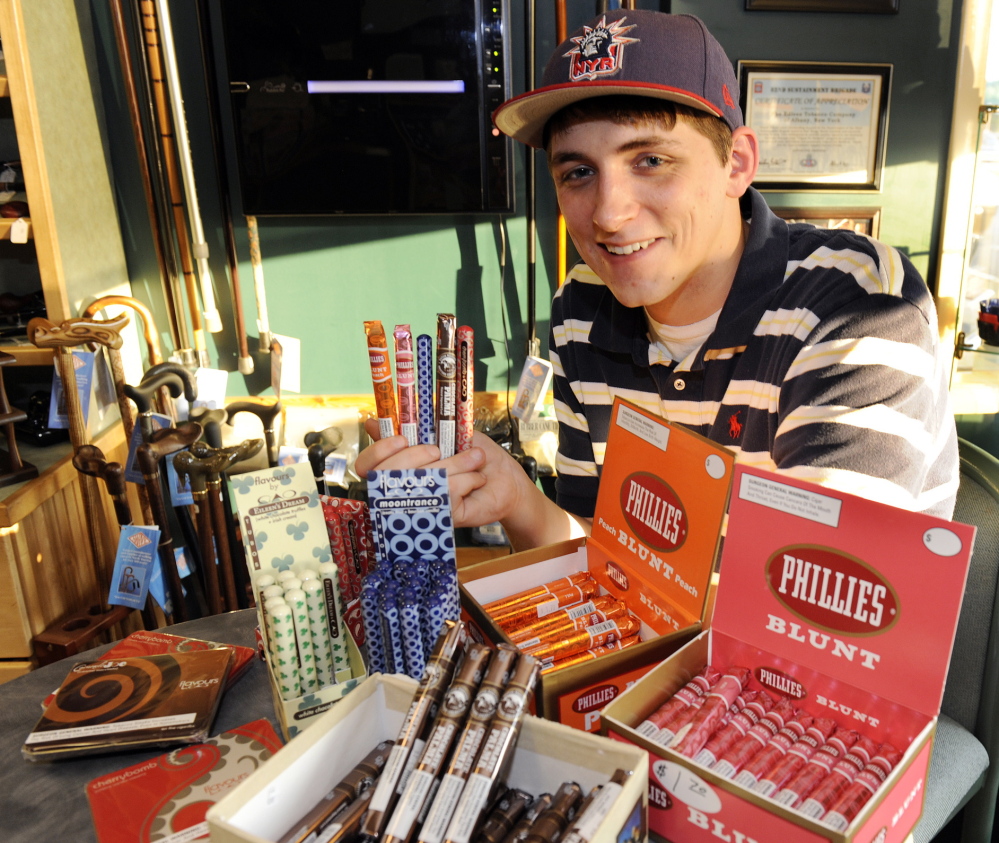WASHINGTON — Flavored cigars that are popular with teens contain the same additives found in Jolly Rancher candies and Kool-Aid drink mixes, lending weight to the argument that tobacco companies take aim at youth, researchers said.
Almost every flavor chemical found in tested sweets, including grape and cherry, are used in combinations in similarly flavored cigars and dipping tobacco, Portland State University researchers said in a letter posted Wednesday by the New England Journal of Medicine.
More than 40 percent of middle and high school students who smoke use flavored small cigars, which are similar in size and shape to cigarettes, or use menthol cigarettes, the Centers for Disease Control and Prevention found in a study last year. A 2009 law banned flavored cigarettes except menthol. While the Food and Drug Administration has called flavored cigarettes a “gateway” for teens to become regular smokers, an agency proposal to regulate cigars wouldn’t prohibit flavored ones.
“For kids and youth, the familiar chemical smells of candies and Kool-Aid will in fact be found in what amounts to ‘candy-flavored tobacco,’” Jim Pankow, one of the Portland State University researchers, said in a telephone interview.
Pankow is a chemistry professor who was the first to publish how to measure the amount of a certain form of nicotine delivered by tobacco smoke.
The researchers examined tobacco products including peach Swisher Sweets cigarillos, made by Swisher International Inc., grape Phillies Blunt cigars from Imperial Tobacco Group, cherry cigars from Cheyenne International in addition to Altria Group’s apple Skoal snuff.
“We know from the existing science that flavorings can mask the harshness and taste of tobacco, making them easier to use and more appealing particularly for youth,” Brian King, senior adviser to the CDC’s Office on Smoking and Health, said in a telephone interview. “The fact that these products are available is problematic.”
In cherry products, benzaldehyde proved a popular chemical in Cheyenne cigars, Kraft Foods Group’s Kool-Aid and Mars’ Lifesavers. In grape products, methyl anthranilate is prominent in Cheyenne cigars, Phillies Blunts, Kool-Aid and The Hershey Co.’s Jolly Ranchers. Benzaldehyde is also known as artificial almond oil and methyl anthranilate occurs naturally in some grapes, according to the National Center for Biotechnology Information.
Joe Augustus, a spokesman for Swisher, said the small cigars aren’t targeted at children. The Jacksonville, Florida- based company doesn’t advertise to consumers, and he emphasized that states have laws banning sale to minors.
“Flavored tobacco products have been around since the Indians started flavoring their tobacco,” Augustus said in a telephone interview. “We don’t hardly do any consumer advertising. I’m not sure how they’d be targeted at kids.”
The Campaign for Tobacco-Free Kids called flavored cigars “Big Tobacco’s tricks for getting kids hooked on their products” in a blog post in October.
“For all intents and purposes, these products are flavored cigarettes,” King, the CDC adviser, said.
The tax structure differentiates between “little” cigars and large cigars, though only by weight, not size. Large cigars are taxed less heavily, often making them cheaper to purchase.
While cigarette smoking continued an 11-year decline in 2011, cigarette-like large cigar smoking tripled in 2011 from 2000, the CDC said.
This makes it difficult for FDA’s ban on flavored cigarettes to have an effect on smoking alone, Thomas Glynn, director of cancer science and trends at the American Cancer Society Cancer Action Network, said.
Send questions/comments to the editors.



Comments are no longer available on this story